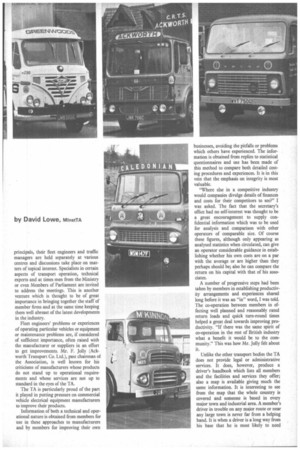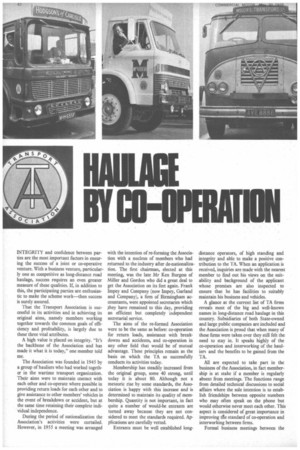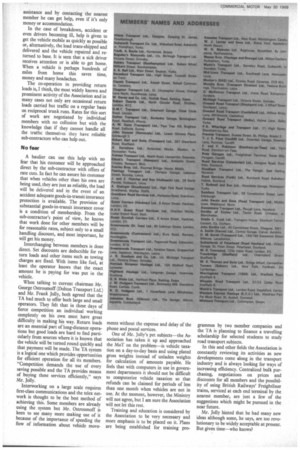by David Lowe, minstTA INTEGRITY and confidence between parties are
Page 45

Page 44

Page 46

If you've noticed an error in this article please click here to report it so we can fix it.
the most important factors in ensuring the success of a joint or co-operative venture. With a business venture, particularly one as competitive as long-distance road haulage, success requires an even greater measure of these qualities. If, in addition to this, the participating parties are enthusiastic to make the scheme work—then success is surely assured.
'l'hat the Transport Association is successful in its activities and in achieving its original aims, namely members working together towards the common goals of efficiency and profitability, is largely due to these three vital attributes.
A high value is placed on integrity. "It's the backbone of the Association and has made it what it is today," one member told me.
The Association was founded in 1945 by a group of hauliers who had worked together in the wartime transport organization. Their aims were to maintain contact with each other and co-operate where possible in providing return loads for each other and to give assistance to other members' vehicles in the event of breakdown or accident, but at the same time retaining their complete individual independence.
During the period of nationalization the Association's activities were curtailed. However, in 1955 a meeting was arranged with the intention of re-forming the Association with a nucleus of members who had returned to the industry after de-nationalization. The first chairman, elected at this meeting, was the late Mr Ken Burgess of Miller and Gordon who did a great deal to get the Association on its feet again. Frank Impey and Company (now Irnpey, Garland and Company), a firm of Birmingham accountants, were appointed secretaries which they have remained to this day, providing an efficient but completely independent secretarial service.
The aims of the re-formed Association were to be the same as before: co-operation for return loads, assistance with breakdowns and accidents, and co-operation in any other field that would be of mutual advantage. These principles remain as the basis on which the TA so successfully conducts its activities today.
Membership has steadily increased from the original group, some 40 strong, until today it is about 80. Although not a meteoric rise by some standards, the Association is happy with this increase and is determined to maintain its quality of membership. Quantity is not important, in fact quite a number of would-be entrants are turned away because they are not considered to meet the standards required. Applications are carefully vetted.
Entrants must be well established long
distance operators, of high standing and integrity and able to make a positive contribution to the TA. When an application is received, inquiries are made with the nearest member to find out his views on the suitability and background of the applicant whose premises are also inspected to ensure that he has facilities to suitably maintain his business and vehicles.
A glance at the current list of TA firms reveals most of the big and well-known names in long-distance road haulage in this country. Subsidiaries of both State-owned and large public companies are included and the Association is proud that when many of these firms were taken over they still felt the need to stay in. It speaks highly of the co-operation and interworking of the hauliers and the benefits to be gained from the TA.
All are expected to take part in the business of the Association, in fact membership is at stake if a member is regularly absent from meetings. The functions range from detailed technical discussions to social affairs where the sole intention is to establish friendships between opposite numbers who may often speak on the phone but would otherwise never meet each other. This aspect is considered of great importance in improving tile standard of co-operation and interwor king between firms.
Formal business meetings between the principals, their fleet engineers and traffic managers are held separately at various centres and discussions take place on matters of topical interest. Specialists in certain aspects of transport operation, technical experts and at times men from the Ministry or even Members of Parliament are invited to address the meetings. This is another venture which is thought to be of great importance in bringing together the staff of member firms and at the same time keeping them well abreast of the latest developments in the industry.
Fleet engineers' problems or experiences of operating particular vehicles or equipment or maintenance problems are, if considered of sufficient importance, often raised with the manufacturer or suppliers in an effort to get improvements. Mr. F. Jolly (Ackworth Transport Co. Ltd.), past chairman of the Association, is well known for his criticisms of manufacturers whose products do not stand up to operational requirements and whose services are not up to standard in the eyes of the TA.
The TA is particularly proud of the part it played in putting pressure on commercial vehicle electrical equipment manufacturers to improve their products.
Information of both a technical and operational nature is obtained from members for use in these approaches to manufacturers and by members for improving their own businesses, avoiding the pitfalls or problems which others have experienced. The information is obtained from replies to statistical questionnaires and use has been made of this method to compare both detailed costing procedures and experiences. It is in this vein that the emphasis on integrity is most valuable.
"Where else in a competitive industry would companies divulge details of finances and costs for their competitors to see?" I was asked. The fact that the secretary's office had no self-interest was thought to be a great encouragement to supply confidential information which was to be used for analysis and comparison with other operators of comparable size. Of course these figures, although only appearing as analysed statistics when circulated, can give an operator considerable guidance in establishing whether his own costs are on a par with the average or are higher than they perhaps should be; also he can compare the return on his capital with that of his associates.
A number of progressive steps had been taken by members in establishing productivity arrangements and experiences shared long before it was an "in" word, I was told. The co-operation between members in effecting well planned and reasonably rated return loads and quick turn-round times helped a great deal towards improving productivity. "If there was the same spirit of co-operation in the rest of British industry what a benefit it would be to the community." This was how Mr. Jolly felt about it.
Unlike the other transport bodies the TA does not provide legal or administrative services. It does, however, produce a driver's handbook which lists all members and the facilities and services they offer; also a map is available giving much the same information. It is interesting to see from the map that the whole country is covered and someone is based in every major town and industrial area. A member's driver in trouble on any major route or near any large town is never far from a helping hand. It is when a driver is a long way from his base that he is most likely to need assistance and by contacting the nearest member he can get help, even if it's only money or accommodation.
In the case of breakdown, accident or even drivers becoming ill, help is given to get the vehicle mobile as quickly as possible or, alternatively, the load trans-shipped and delivered and the vehicle repaired and returned to base. It is seen that a sick driver receives attention or is able to get home. When a vehicle is perhaps hundreds of miles from home this saves time, money and many headaches.
The co-operation in providing return loads is, I think, the most widely known and prominent activity of the Association and in many cases not only are occasional return loads carried but traffic on a regular basis on reciprocal trunk runs. Rates for this sort of work are negotiated by individual members with no collusion but with the knowledge that if they cannot handle all the trattic themselves they have reliable sub-contractors who can help out.
No fear A haulier can use this help with no fear that his customer will be approached direct by the sub-contractor with offers of rate cuts. In fact he can assure his customer that when vehicles other than his own are being used, they are just as reliable, the load will be delivered and in the event of an accident adequate goods-in-transit insurance protection is available. The provision of substantial goods-in-transit insurance cover is a condition of membership. From the sub-contractor's point of view, he knows that work done for other members will be for reasonable rates, subject only to a small handling discount, and most important, he will get his money.
Interchanging between members is done direct. Set discounts are deductible for return loads and other items such as towing charges are fixed. With items like fuel, at least the operator knows that the exact amount he is paying for was put in the vehicle.
When talking to current chairman Mr. George Ostroumoff (Dolton Transport Ltd.) and Mr. Frank Jolly, both agreed that the TA had much to offer both large and small operators. They felt that in these days of fierce competition an individual working completely on his own must have great difficulty in making his way. Return loads are an essential part of long-distance operations but good loads are hard to find particularly from sources where it is known that the vehicle will be turned round quickly and that payment will be made. The TA system is a logical one which provides opportunities for efficient operation for all its members. "Competition demands the use of every saving possible and the TA provides means of buying these services efficiently," says Mr. Jolly.
Interworking on a large scale requires first-class communications and the telex network is thought to be the best method of achieving this. Some members are already using the system but Mr. Ostroumoff is keen to see many more making use of it because of the importance of speeding the flow of information about vehicle move ments without the expense and delay of the phone and postal services.
One of Mr. Jolly's pet subjects the Association has taken it up and approached the MoT on the problem—is vehicle taxation on a day-to-day basis and using plated gross weights instead of unladen weights for calculation of amounts payable. He feels that with computers in use in government departments it should not be difficult to computerize vehicle taxation so that refunds can be claimed for periods of less than one month when vehicles are not in use. At the moment, however, the Ministry will not agree, but I am sure the Association will not let this rest.
Training and education is considered by the Association to be very necessary and more emphasis is to be placed on it. Plans are being established for training pro grammes by two member companies and the TA is planning to finance a travelling scholarship for selected students to study road transport subjects.
In this and other fields the Association is constantly reviewing its activities as new developments come along in the transport industry and is always looking for ways of increasing efficiency. Centralized bulk purchasing, negotiations on prices and discounts for all members and the possibility of using British Railways' Freightliner trains, serviced at each end terminal by the nearest member, are just a few of the suggestions which might be pursued in the near future.
Mr. Jolly hinted that he had many new ideas although some, he says, are too revolutionary to be widely acceptable at present. But given time—who knows?












































































































